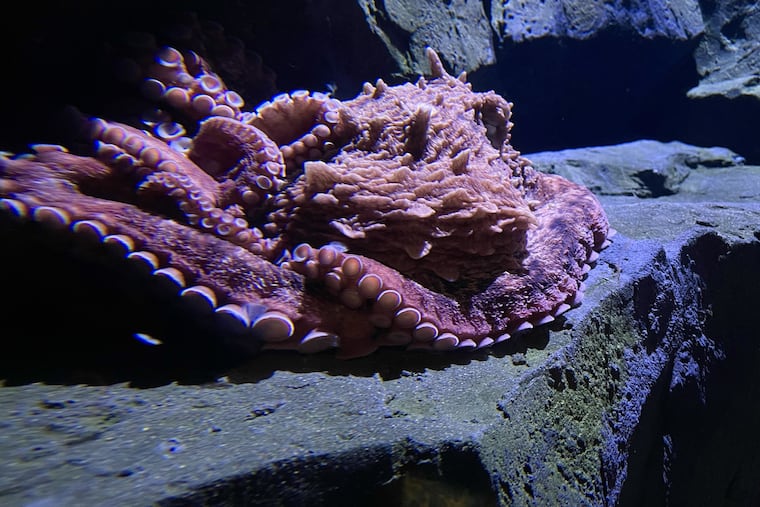A new octopus at Adventure Aquarium came armed with a mystery
As one octopus faded into senescence, another arrived with an enigma.

If you’re a sucker for a good story, the Adventure Aquarium’s new cephalopod resident arrived last month with a mystery nobody can quite wrap their arms around.
Charlie, the giant Pacific octopus, was given to the Adventure Aquarium in Camden by its new sister facility, the Vancouver Aquarium. When Charlie arrived, staffers discovered the octopus was missing about half of its third right arm.
The tip of that arm is how biologists determine the sex of an octopus, according to Kim Roberts, a biologist with the fish and invertebrate husbandry program at Adventure Aquarium. She said if the octopus is a female, the suction cups will go all the way down the arm, and if it’s male, the arm won’t have suction cups on the last few inches.
“So we cannot tell if Charlie is male or female,” Roberts said. “I like to base it off their mood, whether it’s a Charlotte or a Charles.”
Biologists will only be able to determine Charlie’s sex when the octopus either dies and a necropsy (the animal equivalent of an autopsy) is performed, or if Charlie lays eggs, Roberts said.
Even though Charlie lives alone in a tank, if female, the octopus could still produce and lay eggs, though those eggs would not be fertilized or viable, according to Roberts.
When and if that occurs, Charlie will be near the end of its life cycle, which averages around three to five years for giant Pacific octopuses, Roberts said. Male octopuses typically die after mating, and females die after laying and brooding their eggs.
But before death, octopuses enter into a natural stage of life called senescence. It’s the process of growing old. Humans go through it too (it’s what’s behind wrinkles and worsening eye sight), but given a giant Pacific octopus’ short life span, it happens much quicker for them, Roberts said.
The aquarium’s last octopus, Europa, laid her eggs late last year and went into senescence shortly thereafter.
“I was doing welfare assessments weekly and her eyes were getting cloudy and she was doing pumpkin-shaping, holding her arms around her mantle and puckering out like a pumpkin,” Roberts said, of the telltale signs of octopus senescence.
Last month, Europa was moved to a back-of-house exhibit, where she received end-of-life care before being humanely euthanized last week.
It was tough for Roberts, who’d saved Europa’s “gotcha” date in her phone and taught her tricks — like how to go into a laundry basket to be weighed — during the “sassy” octopus’ two years at the aquarium.
“I get very connected to them,” she said.
Charlie, who is 17 pounds and believed to be about a year old, is still warming up to its new environment but has started to come to Roberts and some of her assistants when they approach.
According to Danny Kent, curator for the Vancouver Aquarium’s Canadian waters and propagation program, Charlie was already missing the tip of its arm when collected by two of the aquarium’s biologist divers.
“Any guess as to how it lost its arm tip would be pure speculation on our part, but likely from the bite of a predator (fish, seal, sea lion…) or even from the bite of a prey item (crab?),” Kent wrote in an email “It is very common for us to find octopus in the field with arm tips missing or sometimes even whole arms gone.”
Kent said octopuses are capable of some level of regeneration of their arm tips over time (his aquarium once had an octopus that grew two new arm tips where one had been previously). The fact that Charlie’s hasn’t grown back yet suggests that it may have been recently bitten off, he said.
Roberts said she’s worked with many animals at Adventure Aquarium but has a special connection with the octopuses.
“They’re so smart, and I love enrichment and training,” she said. “I currently work with jellyfish too. Dealing with their entire life span is cool, but it’s not the same feeding a jellyfish that doesn’t know you’re there versus feeding an octopus who’s excited to see you.”